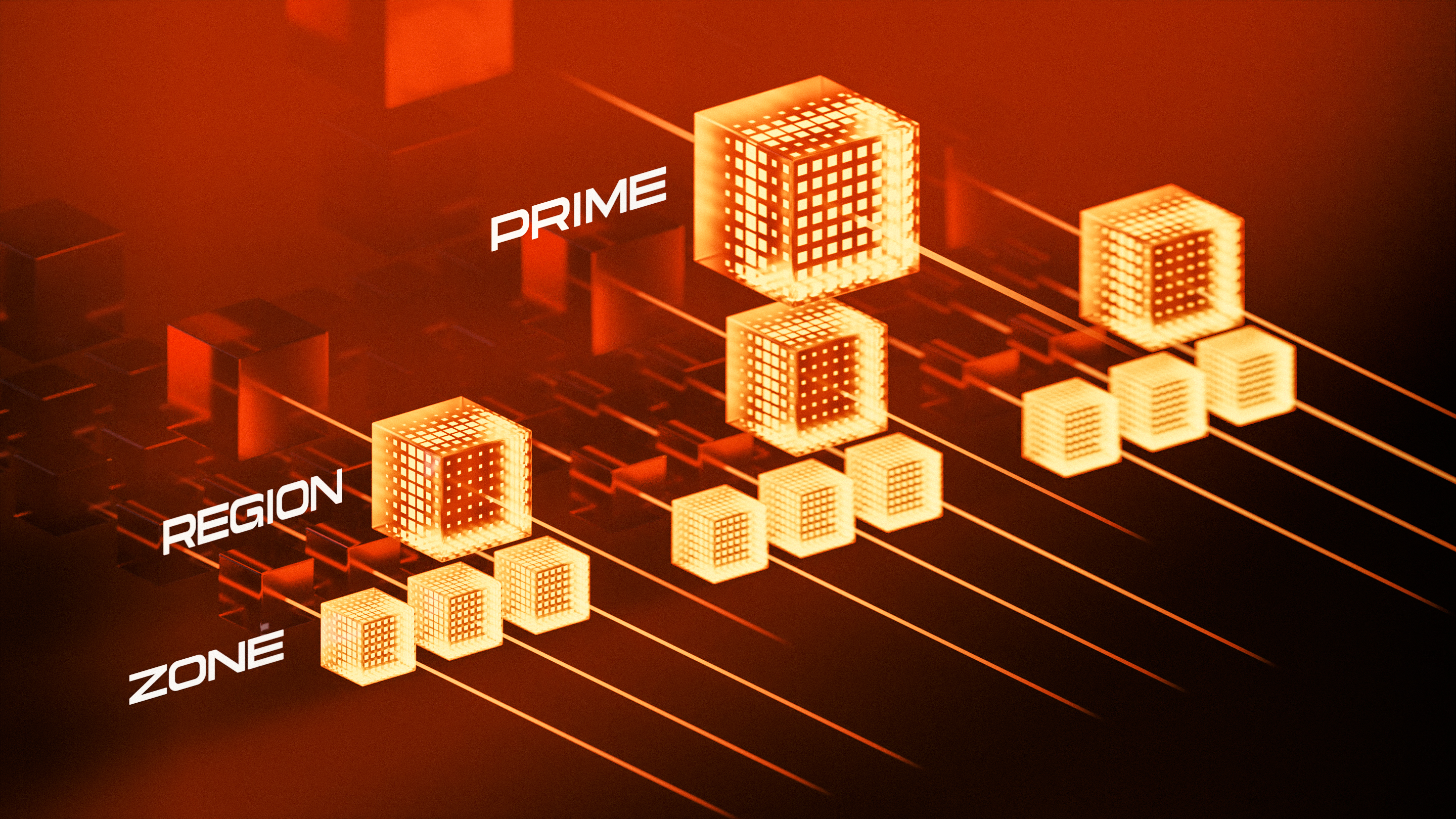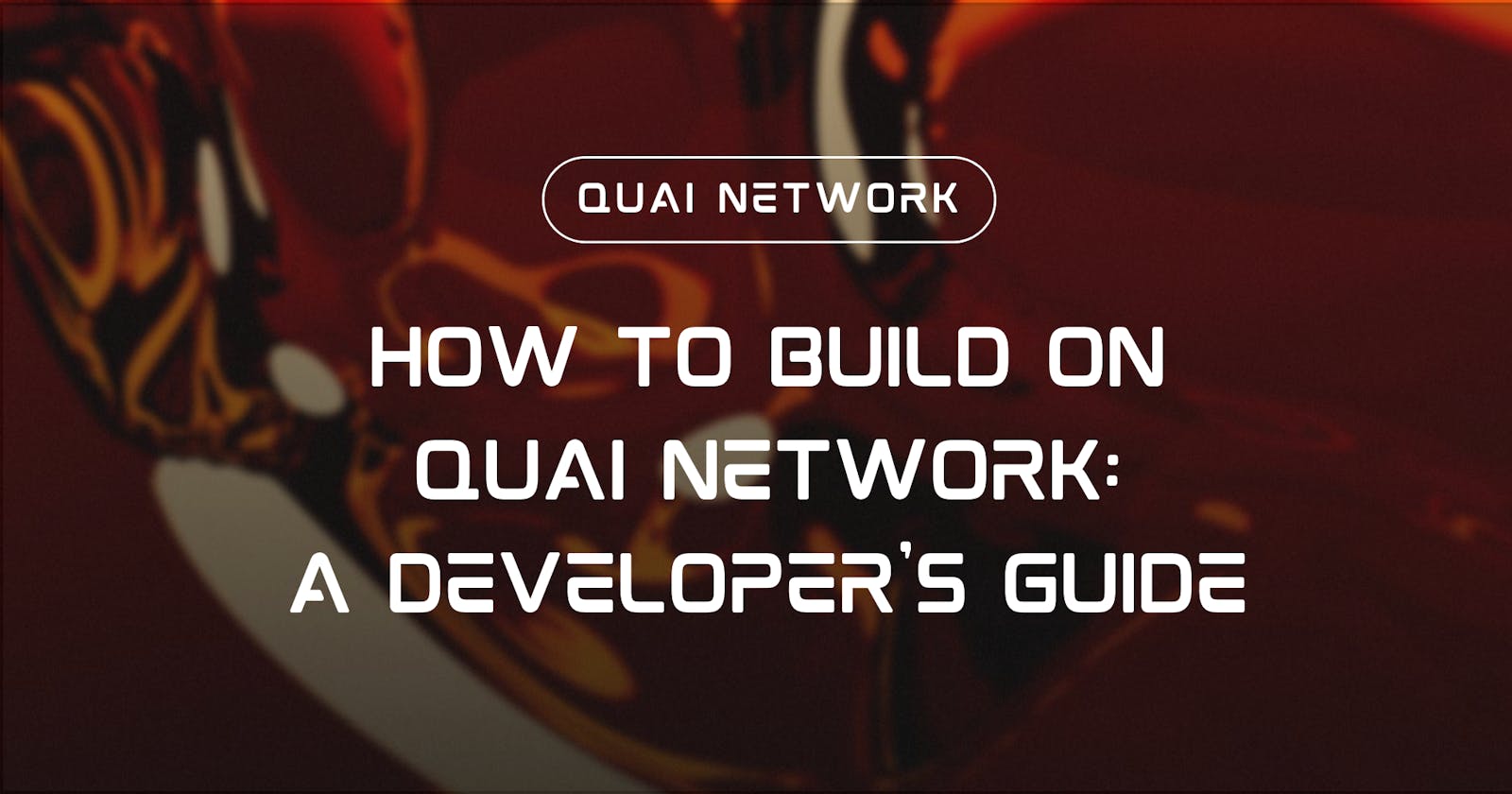Table of contents
- Introduction
- What is Quai Network?
- Why Build on Quai Network?
- Getting Started with Quai Network
- Applications Developers Can Build on Quai Network
- 1. Decentralized Finance (DeFi) Applications:
- 2. Supply Chain Management Solutions:
- 3. Decentralized Identity Management:
- 4. Tokenization Platforms:
- 5. Gaming and Non-Fungible Token (NFT) Marketplaces:
- 6. Decentralized Autonomous Organizations (DAOs):
- 7. Healthcare Data Management:
- 8. Intellectual Property Management:
- 9. Decentralized Social Networks:
- 10. Energy Trading and Grid Management:
- Benefits over Other Platforms
- Conclusion
- Additional Resources
- About Quia Network
Introduction
In recent years, blockchain technology has revolutionized various industries by offering decentralized solutions with enhanced security, transparency, and efficiency. Among the multitude of blockchain networks available, Quai Network emerges as a promising platform for developers seeking to build decentralized applications (dApps) and smart contracts. This comprehensive guide aims to assist software developers interested in leveraging Quai Network's capabilities, offering a step-by-step approach to deploying smart contracts, integrating with the network, and highlighting the advantages of developing on Quai Network compared to other platforms.
What is Quai Network?
Quai Network is a next-generation Layer-1 blockchain specifically designed to address the scalability trilemma – the challenge of achieving decentralization, security, and scalability simultaneously in traditional blockchains. It overcomes these limitations by employing a unique sharded architecture and a novel Proof-of-Work 2.0 (PoW 2.0) consensus mechanism.

Here's a breakdown of Quai Network's core functionalities:
Sharded Architecture: Quai Network distributes transaction processing across multiple interconnected blockchains (shards), enabling it to handle a high volume of transactions without sacrificing speed or security.
Proof-of-Work 2.0 (PoW 2.0): This innovative consensus mechanism secures the network by incentivizing miners to contribute computational power. PoW 2.0 improves upon traditional PoW by reducing energy consumption and enhancing security.
Why Build on Quai Network?
Before diving in, let's explore the compelling reasons to choose Quai:
Scalability: As mentioned earlier, Quai boasts a sharded architecture, enabling it to handle a massive transaction volume without compromising speed. Unlike traditional blockchains, Quai scales efficiently, ensuring your dApp (decentralized application) can handle real-world user demands.
Security: Built on a secure consensus mechanism, Quai prioritizes security. This mechanism incentivizes validators to maintain network integrity, fostering a robust and trustworthy environment for your dApp.
Interoperability: Quai embraces a future of interconnected blockchains. It facilitates seamless communication with other blockchains, allowing your dApp to interact with a wider ecosystem and unlock new functionalities.
Developer-Friendly: Quai prioritizes developer experience. Its tooling and resources are designed to streamline the development process, empowering you to focus on building exceptional applications.
Community Support: Quai Network boasts a vibrant community of developers, researchers, and enthusiasts, providing support, resources, and collaboration opportunities for developers building on the platform.
Innovation: Quai Network fosters innovation by offering a flexible and versatile platform for experimenting with new ideas and technologies, driving forward the evolution of decentralized applications and blockchain technology.
Getting Started with Quai Network
Now that you're excited about the possibilities, let's get your hands dirty! Here's a step-by-step guide to building on Quai:

- Set Up Your Development Environment:
Visit the Quai Network developer website (https://qu.ai/docs/) to access installation guides for the necessary tools.
Install the Quai Network command-line interface (CLI) to interact with the network from your terminal.
Choose your preferred smart contract development environment. Solidity is a popular option, but Quai supports various languages.
- Write Your Smart Contract:
Develop your smart contract logic using your chosen language.
Ensure your contract adheres to Quai's smart contract standards. The developer documentation provides detailed specifications.
Test your contract thoroughly using a local testnet environment before deploying it to the mainnet.
- Deploy Your Smart Contract:
Use the Quai Network CLI to compile your smart contract code.
Connect your CLI to a Quai node (validator) using its RPC URL.
Deploy your compiled contract to the network using the
quaicommand-line tool.
- Interact with Your Smart Contract:
The Quai Network CLI allows you to interact with your deployed contract.
You can call contract functions, read data from the blockchain, and simulate transactions.
- Integrate Your dApp with Quai Network:
Use Quai's developer libraries (SDKs) for your chosen programming language to integrate your dApp with the network.
These libraries provide functions to interact with smart contracts, manage wallets, and access network data.
The developer documentation offers comprehensive guides and code examples for seamless integration.
Applications Developers Can Build on Quai Network
Developers leveraging the Quai Network ecosystem have a vast array of possibilities for building decentralized applications (dApps) and smart contracts. The versatility of the platform allows for the creation of innovative solutions across various industries. Here are some examples of applications developers can build on the Quai Network:

1. Decentralized Finance (DeFi) Applications:
Quai Network provides an ideal platform for developing DeFi applications, offering solutions for lending, borrowing, decentralized exchanges (DEX), liquidity pools, and yield farming. Developers can build decentralized lending protocols, automated market makers (AMMs), and tokenization platforms for various assets.
2. Supply Chain Management Solutions:
Blockchain technology is well-suited for supply chain management, providing transparency, traceability, and efficiency. Developers can create dApps on Quai Network for tracking and authenticating goods throughout the supply chain, reducing counterfeiting, enhancing product provenance, and optimizing logistics.
3. Decentralized Identity Management:
Quai Network enables developers to build decentralized identity management solutions, offering users greater control over their personal data and digital identities. Applications can include decentralized authentication systems, digital identity verification platforms, and secure identity storage solutions.
4. Tokenization Platforms:
Tokenization platforms on Quai Network allow developers to create and manage digital assets represented as tokens on the blockchain. These tokens can represent ownership of real-world assets such as real estate, artwork, or securities, enabling fractional ownership, liquidity, and transparent trading.
5. Gaming and Non-Fungible Token (NFT) Marketplaces:
Developers can build gaming platforms and NFT marketplaces on Quai Network, leveraging blockchain technology to provide secure ownership, provenance, and interoperability of in-game assets and digital collectibles. These platforms can facilitate the creation, trading, and monetization of unique digital assets.
6. Decentralized Autonomous Organizations (DAOs):
Quai Network supports the creation of DAOs, decentralized organizations governed by smart contracts and token holders. Developers can build DAO frameworks for community governance, decision-making, and resource allocation, enabling transparent and democratic management of decentralized projects and communities.
7. Healthcare Data Management:
Blockchain technology can revolutionize healthcare data management by providing secure and interoperable solutions for storing, sharing, and accessing medical records and patient information. Developers can create dApps on Quai Network for electronic health records (EHR), medical supply chain tracking, and clinical trial management.
8. Intellectual Property Management:
Developers can build platforms on Quai Network for managing intellectual property rights, including patents, copyrights, and trademarks. These platforms can utilize blockchain technology to enforce digital rights, track ownership, and facilitate licensing and royalty payments transparently and efficiently.
9. Decentralized Social Networks:
Quai Network enables developers to create decentralized social networks that prioritize user privacy, data ownership, and content censorship resistance. These platforms can empower users to control their social media data, interact directly with peers, and incentivize content creation and curation through token rewards.
10. Energy Trading and Grid Management:
Blockchain technology can facilitate peer-to-peer energy trading and decentralized grid management, enabling efficient allocation and utilization of renewable energy resources. Developers can build dApps on Quai Network for energy trading platforms, demand response systems, and grid optimization solutions.
Benefits over Other Platforms
While established platforms exist, Quai offers distinct advantages:
Transaction Fees: Quai's gas fees are significantly lower compared to popular blockchains, making it cost-effective for users and developers alike.
Faster Transactions: Quai's sharding architecture enables faster transaction processing times, leading to a more responsive user experience for your dApp.
Active Development: The Quai team is constantly innovating and improving the network, ensuring your dApp benefits from ongoing advancements.
Conclusion
Quai Network empowers developers to build robust, scalable, and secure dApps. With its developer-friendly tools, interoperability, and cost-effectiveness, Quai presents a compelling platform for the future of blockchain development. Take the first step today and join the Quai developer community to unlock the potential of your innovative ideas!
I'd love to connect with you on Twitter | LinkedIn | Instagram.
Additional Resources
Quai Network Website: https://qu.ai/
Quai Network Documentation: Quai Network Documentation | Quai Network Documentation
Quai Network Tutorial: Tutorials | Quai Network Documentation
Quai Network Smart Contracts: Smart Contracts | Quai Network Documentation
Quai Network APIs: APIs | Quai Network Documentation
Quai Network Learn: Introduction | Quai Network Documentation
Quai Network Twitter Page: https://twitter.com/quainetwork?lang=en
Quai Network Discord Community: https://discord.gg/quai/
Quai Network Telegram Community: https://t.me/QuaiNetwork/
Quai Network Youtube Channel: https://www.youtube.com/channel/UCA7wfK91O1CmwHm4LELnNHw
About Quia Network
Quai Network operates as an open-source blockchain network, implementing a Proof-of-Entropy-Minima consensus mechanism and merged mining techniques to bolster both throughput and security. Participants on Quai Network can expect swift transaction processing times without sacrificing the fundamental tenets of decentralization and security. Additionally, miners stand to benefit from competitive mining prospects across the diverse range of blockchains integrated within the network.
With a capacity for processing thousands of transactions per second, Quai Network represents a novel scalability solution poised for imminent mainnet deployment.
